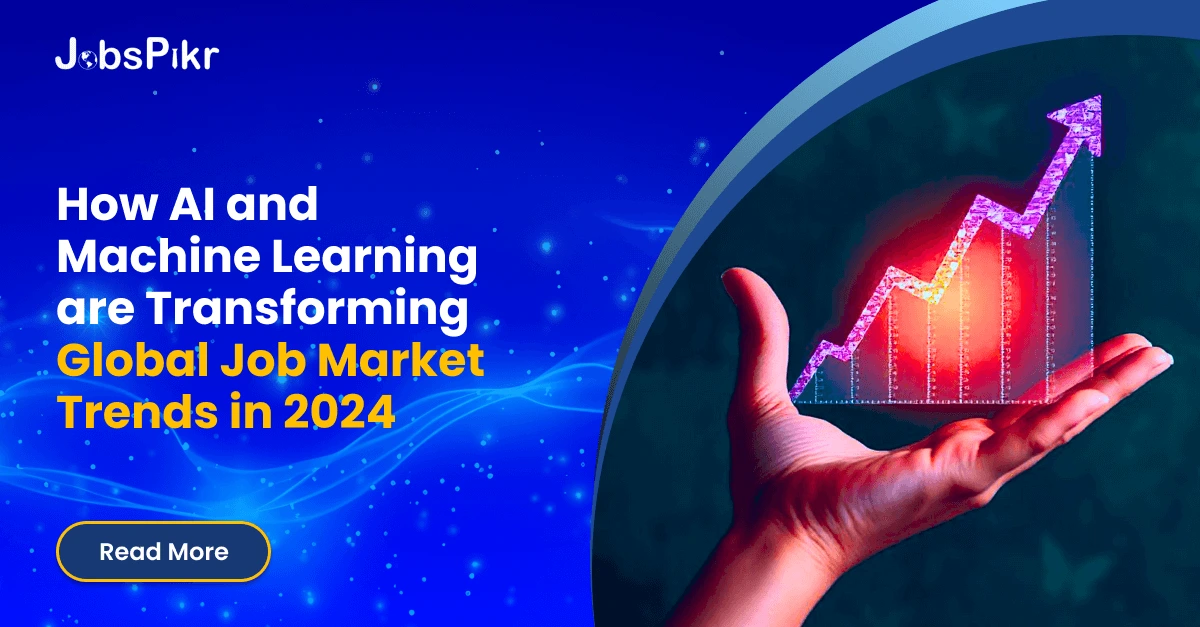As we move deeper into 2024, it’s clear that artificial intelligence (AI) and machine learning (ML) are no longer just buzzwords in the tech world—they are key drivers shaping the future of work. For businesses looking to stay ahead of the curve, understanding and leveraging current job market trends is essential for effective recruitment and talent acquisition. With AI and ML becoming increasingly prominent, companies need to adapt their hiring strategies to remain competitive. In this article, we’ll dive into how AI and machine learning are transforming global job market trends in 2024, and how companies can adjust to these shifts to ensure they attract and retain top talent.
How AI and Machine Learning are Revolutionizing the Job Market?
AI and Machine Learning (ML) are revolutionizing industries by automating tasks, improving decision-making, and creating efficiencies that were once unimaginable. These technologies are also redefining workforce dynamics, as the skills required in today’s workplace are rapidly changing. As organizations harness AI and machine learning, their impact on global job market trends becomes increasingly evident.
For instance, AI is reshaping traditional roles and creating new job opportunities that didn’t exist a few years ago. In fields such as data science, cybersecurity, and AI development itself, there has been a surge in demand for highly skilled professionals. Simultaneously, automation is displacing jobs that involve repetitive or manual tasks, prompting workers to upskill or reskill to remain relevant.
To stay competitive, companies must keep a close eye on workforce trend analysis and adapt their recruitment strategies to align with these evolving job market dynamics. Let’s explore how AI and ML are affecting different aspects of the global job market.
How Job Automation Is Transforming Workforce Dynamics?
A major trend in the job market today is the increasing role of automation in the workplace. AI-powered machines can now perform tasks that once required human input—think of self-checkout systems, automated report generation, and even AI-driven customer service solutions like chatbots. This shift is not just transforming the tasks employees perform but also the types of jobs available.
Roles that involve repetitive tasks are at risk of being replaced by AI. For example, jobs in manufacturing, data entry, and routine administrative tasks have already seen a reduction in demand. On the other hand, new positions requiring advanced technical skills—such as AI specialists, data engineers, and software developers—are emerging to support the growing reliance on AI.
For companies looking to stay ahead of the curve, understanding job market trends related to automation is critical. Businesses that fail to anticipate these changes risk falling behind their competitors in talent acquisition and retention. By closely monitoring the evolution of these trends, organizations can proactively adjust their hiring needs and focus on upskilling their current workforce to bridge potential skill gaps.
Why Data and AI Talent Is in High Demand Today?
One of the most significant trends in the job market today is the soaring demand for professionals with expertise in AI, machine learning, and data science. The ability to harness the power of data to drive decision-making is invaluable for companies across industries, and as a result, data-driven roles are among the fastest-growing jobs globally.
According to US job market trends, demand for AI specialists, data scientists, and machine learning engineers has skyrocketed in the past few years, and the trend shows no signs of slowing down. Companies are vying for top talent in these fields, leading to a competitive hiring landscape where highly skilled professionals are in short supply.
To secure these in-demand candidates, businesses must offer not only competitive salaries but also opportunities for career development and access to cutting-edge technology. Focusing on a recruitment strategy that highlights innovation, growth potential, and an AI-driven workplace can help attract top-tier talent.
Upskilling and Reskilling: Steps for Future Workforce Readiness
While automation and AI-driven tools are streamlining processes and transforming industries, they are also changing the skills needed to thrive in the modern workforce. As automation takes over routine tasks, soft skills such as problem-solving, creativity, and collaboration are becoming increasingly important. Additionally, technical skills related to AI, machine learning, and data analysis are now highly sought after.
This shift in skill requirements highlights a key workforce trend: the importance of upskilling and reskilling. Employees must be equipped with the right knowledge and capabilities to remain relevant in a job market where AI and automation are at the forefront. Similarly, companies need to invest in continuous learning and development programs that prepare their workforce for the future.
Organizations that prioritize upskilling and reskilling will have a competitive edge when it comes to talent acquisition and retention. In fact, offering employees opportunities for professional development can enhance employer branding and make a company more attractive to top talent. Trends in the job market indicate that candidates today are not just looking for high-paying roles—they want jobs that offer learning opportunities and the chance to evolve in their careers.
Enhancing Talent Acquisition with AI-Powered Recruitment Solutions
The impact of AI on job market trends extends beyond the roles it creates or transforms; AI is also revolutionizing the recruitment process itself. AI-powered recruitment tools are increasingly being used by companies to enhance their hiring strategies, streamline candidate sourcing, and improve the overall efficiency of the recruitment process.
These AI tools can analyze vast amounts of data from job boards, social media platforms, and resumes to identify the best-fit candidates for a role. By leveraging AI, recruiters can quickly narrow down large candidate pools and focus their efforts on high-potential individuals. This is particularly valuable in today’s competitive job market, where finding qualified candidates can be a challenge.
Moreover, AI-driven platforms can help mitigate unconscious bias during the hiring process by focusing on candidates’ skills, experience, and qualifications rather than personal characteristics. This leads to a more inclusive hiring process and ensures that companies are selecting candidates based on merit. By staying up to date with these job market trends, organizations can adopt AI-powered recruitment tools that boost their hiring efficiency and attract the right talent.
How Remote Work Is Expanding the Global Talent Pool?
Another prominent trend in the job market is the ongoing rise of remote work, a shift that has been accelerated by the COVID-19 pandemic and continues to shape workforce trends in 2024. Remote work is no longer seen as a temporary solution but as a permanent fixture in many industries.
With this shift comes an expanded global talent pool. Companies are no longer limited to hiring candidates within a specific geographic location—they can now recruit talent from anywhere in the world. This has opened the door to diverse talent pools, giving businesses access to a broader range of skills and perspectives.
AI and machine learning technologies are playing a critical role in supporting this transition to remote work. Tools like AI-powered collaboration platforms, virtual communication tools, and machine learning-driven project management solutions enable teams to work effectively from different parts of the world. For businesses looking to stay competitive in talent acquisition, offering remote work options and leveraging AI tools to facilitate global collaboration are key strategies to consider.
Workforce Trends Analysis: Staying Ahead of the Curve
To remain competitive in a rapidly evolving job market, companies must engage in continuous workforce trend analysis. This involves regularly evaluating shifts in job market trends and adapting recruitment strategies to meet the changing demands of the workforce. By staying informed about emerging workforce trends in the job market, such as the rise of AI, automation, and remote work, businesses can position themselves to attract top talent and maintain a strong competitive edge.
Market research firms play a vital role in providing insights into job market trends and workforce dynamics. These firms analyze data related to employment, skills demand, and industry shifts, offering valuable information to businesses looking to refine their recruitment strategies. By partnering with market research firms, companies can access data-driven insights that guide their talent acquisition efforts and ensure they are prepared for future workforce challenges.
Conclusion:
As we navigate the global job market in 2024, AI and machine learning continue to be transformative forces shaping the future of work. From automating routine tasks to enhancing recruitment processes, these technologies are driving significant shifts in job market trends and redefining the skills required in today’s workforce.
For businesses to stay competitive, it is essential to monitor and adapt to these trends. Investing in upskilling and reskilling initiatives, leveraging AI-powered recruitment tools, and embracing the rise of remote work are all critical strategies that can help companies succeed in talent acquisition. Additionally, by conducting regular workforce trend analysis and partnering with market research firms, organizations can stay ahead of the curve and ensure they remain competitive in an ever-evolving job market.
Ultimately, the companies that effectively navigate these AI-driven job market trends will be the ones best positioned to attract and retain top talent, securing their place in a rapidly changing world.
To stay ahead and make data-driven hiring decisions, sign up with JobsPikr for real-time job market insights and workforce trend analysis that can sharpen your recruitment strategies.



